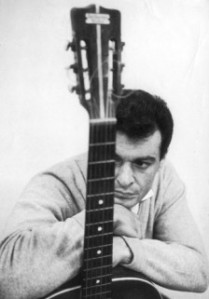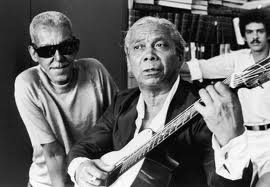Filed under: lyrics | Tags: Astronauta, bossa nova, English lyrics, English version, English versions, eric, Marcos Vasconcelos, marcos vasconselos, Pingarilho, samba, Samba da pergunta, song, the question samba, translation
Today is an exciting milestone for Bossa Nova Daydreams and for my project to create English versions of classic bossa nova and samba songs. That’s because one of our bossa companheiros, Eric, has just shared a video he made of himself performing my English version of Samba da Pergunta (a.k.a. Astronauta) by Pingarilho and Marcos Vasconcelos, which I’ve entitled The Question Samba in English. This is the first time that somebody other than me has brought one of my song translations to life–at least it’s the first time I’m aware of. Eric does a beautiful job creating the hushed yet colorful atmosphere the song needs–very true to the bossa nova aesthetic.
Eric sings and plays through the song twice, first in the original Portuguese version, then in my English version. Thanks, Eric, for taking the time to work this up and for sharing it with us! I hope it inspires others to do the same. You can see my English lyrics for this song in my previous post from May 2010: New English version of “Samba da Pergunta”
Here’s Eric performing The Question Samba (Samba da Pergunta or Astronauta in Portuguese):
Filed under: lyrics | Tags: A Bossa Romântica de Sérgio Ricardo, bossa nova, classics, English version, João Gilberto, lyrics, music, protest, samba, Sergio Ricardo, song, translation, version, Zelão
Sérgio Ricardo is a remarkable Brazilian “Renaissance man”. His creative talents have borne delicious fruit in many different art forms, including music, film, painting and literature. On the occasion of his 80th birthday this year (2012), I thought it would be fitting to honor him with an English version of his well-known song, Zelão.
Ricardo is one of the key figures of classic bossa nova, and he wrote both the lyrics and music for many samba and bossa nova evergreens.
You can hear his richly toned, romantic vocal interpretations of them on a number of classic recordings, such as “A Bossa Romântica de Sérgio Ricardo” and “Um Senhor Talento” (both of which, incidentally, were produced by the legendary Aloysio de Oliveira).
In the late 1950s, Ricardo took over from A.C. Jobim as pianist at the Posto Cinco nightclub in Rio and that is where he developed relationships with many now-famous bossa nova musicians, for example, Johnny Alf, João Donato, João Gilberto, Lúcio Alves and Tito Madi. In 1960, he released his second LP, “A Bossa Romântica de Sérgio Ricardo” (sometimes known as “Não Gosto Mais de Mim”). The album featured the song Zelão, which became a smash hit in Brazil. Zelão was a unique departure in the burgeoning bossa nova genre because it was one of the first bossas to address social issues. Up until then, bossa nova themes were mainly concerned with love and romance. But by 1960, the year Zelão hit the airwaves and record shops, a restless Brazilian middle class, fed up with a failing economy and severe social disparities, was ready for a new kind of protest music—what has been described as “engaged” bossa nova.
Zelão, with its theme of solidarity in the face of poverty and hardship, is emblematic of the new trend, and Ricardo would go on to create and perform many other protest-oriented works. When bossa nova founder João Gilberto was still mostly unknown and more or less itinerant, Sérgio Ricardo housed him in his apartment for several months. According to Ricardo, it was during this stay that Gilberto introduced him to Marxism and other leftist ideas, which heavily influenced the direction Ricardo would take next with his music. (It seems improbable and ironic that João Gilberto, who never really jumped on the protest bandwagon himself, can be sourced as a driver of the Brazilian 1960s protest culture, but appearances can often be deceiving.)
Ricardo was not the only one moving bossa nova towards the political. In the first few years of the 1960s, a rift in the bossa nova community had already appeared, with one camp pushing for a more political role for the music and another saying that bossa nova was about pure feelings and ideas that went beyond politics. Sérgio Ricardo’s music seems to cross the boundary; even when it is political it is at the same time romantic and poetic.
You can find a comprehensive discography and biography of Sérgio Ricardo on his dedicated website, www.sergioricardo.com (the site is only available in Portuguese). In addition to his music, the website presents his work as a film-maker, writer and visual artist, which in many ways is just as significant as his music. Make sure also to check out his bold and lively paintings, which you can find on the website by selecting “Pinturas” (Paintings) under the “Obras” (Works) menu. I’ve also embedded a Youtube video of Ricardo’s original recording of Zelão here.
Here’s my interpretation in English of Zelão. As always, I’ve tried to stay as true as I can to the original words and ideas, only taking liberties where necessary. I’m not sure, but I think this may be the only English version of this song that exists. Happy Birthday, Sérgio! Thanks for bringing so much beauty and truth into the world!
They all knew up on the hill
What made Zelão cry out.
No one laughed, no one joked,
And it was Carnaval. [2x]
The only thing to cook up
Over a shanty-town flame
Are illusions and schemes;
And if you’re lucky, some scraps.
But even so, our Zelão
Always said you should smile,
[that] poor men should help one another
till things are all right.
It rained, it rained.
His shack was knocked down by the raging downpour.
There was no way he could save the guitar.
It tumbled along downhill with the song
About all the things the rain washed away,
Like the piece of his heart that he lost on that day.
They all knew up on the hill
What made Zelão cry out.
No one laughed, no one joked,
And it was Carnaval. [2x]
— English version by Matthew Marth,
based on the original Portuguese version,
entitled “Zelão” by Sérgio Ricardo
Filed under: recommendations | Tags: bossa nova, Brazilian, contemporary, current, MPB, music, Radio Cultura Brasil, resources, samba, SESC instrumental, websites
These days there are lots of websites that offer a chance to hear classic bossa nova and samba music, but not so many that focus on the current musical scene in Brazil. If you’re a Portuguese speaker looking for contemporary manifestations of MPB, Brazilian jazz and samba, you’ll have an easier time of it, since most of the web coverage of these styles is to be found on Brazilian websites, presented solely in Portuguese. But if you’re not a Portuguese speaker, don’t let that deter you. A few minutes spent visually scanning and exploring links on those sites is usually all it takes to find new musical gems. You can always use your browser’s page translator when you can’t make sense of the Portuguese text on your own. Sure, it won’t be a perfect translation (maybe in a couple more decades?), but it will be good enough to help you navigate and find videos, mp3s and other resources.
Now that I have encouraged you with that little confidence-inspiring pep talk, here are a couple of exciting Brazilian music websites with great listening opportunities:
SESC Instrumental (http://www.instrumentalsescbrasil.org.br/)
SESC is a nationwide Brazilian social support organization that promotes Brazilian culture by supporting musicians and artists. The organization provides venues throughout Brazil that showcase many of today’s best Brazilian talent. On the SESC Instrumental website you can find a treasure trove of high-quality videos of live instrumental music concerts that have taken place at SESC venues throughout Brazil. Shows by well-known artists such as Hermeto Pascoal and João Donato are presented alongside lesser known, but no less interesting artists like the Maogani quartet and Luis Leite. Besides the videos, there are also interviews, artist pages, a tv broadcast link and other resources (all in Portuguese). For instant gratification, find the box entitled “Todos os Shows” (“All the Shows”) on the homepage, then click on the button “Ver todos” (“See them all”) to see the complete list of videos sorted by date and artist/group. (Note that all these videos are also posted on YouTube.) Thanks to Angelo da Silva for giving me the tip about this site!
Cultura Brasil, Brazilian music portal (http://www.culturabrasil.com.br/)
This website is the portal to a wide variety of musical offerings presented by São Paulo-based Radio Cultura Brasil, an organization that has been promoting Brazilian music on the air since 1936. Here you will find an archive with lots of themed radio shows that are great samplers of both current and historical music trends in Brazil. There are also themed playlists, such as “O Fino de Elis”, a “best of” overview of Elis Regina recordings, or “Instrumental cerebral paulistano”, an aural voyage through the “cerebral” instrumental music of 1980s São Paulo. Other resources on the site include special radio programs, podcast support, interviews, photos and a live radio stream. Even if you don’t understand Portuguese, if you can sit patiently through a few seconds of talk here and there, you will be richly rewarded with a huge variety of great Brazilian music of all genres—all gratis! Time to put up the “Gone fishin’ ” sign…
Filed under: lyrics | Tags: bossa nova, Brazilian, classic, classics, English lyrics, English version, Foi um rio que passou em minha vida, lyrics, Meu Pecado, music, My sin, new, O Meu Pecado, Paulinho da Viola, samba, song, translation, version
[In my original post, I attributed authorship of “O Meu Pecado” to Paulinho da Viola, but the actual author of the song is Zé Kéti. Thanks to AD of brazilliance.wordpress.com” for pointing out my error.]
Paulinho da Viola is one of my favorite Brazilian samba and choro artists. He is a comprehensive talent: his singing voice, guitar and cavaquinho playing are all characterized by a clean, smooth and gentle quality, and his original compositions and interpretations encapsulate the core essence of Rio’s samba spirit. His version of Zé Kéti’s song “O Meu Pecado” can be heard on his 1970 album “Foi um rio que passou em minha vida”.
When I posted this yesterday I must have had one too many margaritas, because I had decided to use “my transgression” as the translation of the first line (“meu pecado” in Portuguese). When I woke up this morning I had to admit to myself that even though “my transgression” has its advantages, it’s just too elevated in register and doesn’t suit the conversational quality of the song. So now I’ve settled on using “my sin”, which is how most people would probably translate the title. It doesn’t have as many syllables as “meu pecado”, but since the melody for that line has only three distinct pitches, I think it’s manageable. You just have to sing the first two pitches on the “my” and not reiterate the last pitch. Sometimes when translating from Portuguese to English you just have to accept such compromises. Here’s what I ended up with:
My Sin [alt.: My Transgression]
(O Meu Pecado)
My sin [alt.: My transgression]
was that I wanted in my youth
to love so many women.
My time has come and gone.
I long for the old days.
My sin
was that I spent all my nights drinking
and singing serenades
down in the city.
But now that I’m broke,
it seems women just don’t want me anymore.
Oh, if only things could go back
to the way they were before.
— English version by Matthew Marth,
based on the original Portuguese version,
entitled “O Meu Pecado” by Zé Kéti
[Since I posted this I’ve received feedback from some people saying they think “My Transgression” works better than “My Sin”. I’m still not sure, so I’m putting up as an alternative version, and you can decide for yourself.]
Filed under: lyrics | Tags: Astronauta, bossa nova, Brazilian, classic, English lyrics, English version, lyrics, Marcos Vasconcelos, music, new, Pingarilho, question samba, samba, Samba da pergunta, song, translation, version
This translation has been brewing for quite a while. It’s been a joy to work on because not only is the music lovely, but the lyrics are truly poetic–a kind of quiet explosion of colors. The poem is full of vivid images assembled in such a way to create a fantastic, metaphysical and emotionally charged atmosphere. The way I read it, there is no one absolute sense or meaning–it is intentionally abstract. That’s part of what gives it its magic.
Elis Regina’s perfect rendition on the album “Como & Porque” was my first chance to fall in love with the song. João Gilberto has his own haunting version on the album “João Gilberto en México” (1970). I highly recommend both.
Keeping to the sense and spirit of the original version was a special challenge with this one. As a result, how the words and syllables line up with the music may be a little confusing at first. To make it more useful, here is a pdf file that shows the music with the English lyrics underneath. (Sorry it looks so rough, I don’t have Finale right now.)Question_Samba_ENG
I could be wrong, but I think this is the first time this song is being made available in an English version. I’m not aware of any other.
A final note: In the original Portuguese, the song is also sometimes entitled “Astronauta” (not to be confused with the samba “O Astronauta” by Vinicius de Moraes and Baden Powell).
The Question Samba
(Samba da Pergunta)
Now she’s living
all alone in contemplation,
or perhaps up in the heavens,
in everything that flies through the sky.
She could be an astronaut, or
she could be a little songbird,
or become a gust of wind, or
a kite made of silken paper,
a little balloon, or maybe
she is on an asteroid, or
she could be the morning star that you can see from down here.
She could be somewhere on Mars now,
never to be heard from again.
She’s just disappeared…
— English version by Matthew Marth,
based on the original Portuguese version,
entitled “Samba da Pergunta” by
Pingarilho and Marcos Vasconcelos




